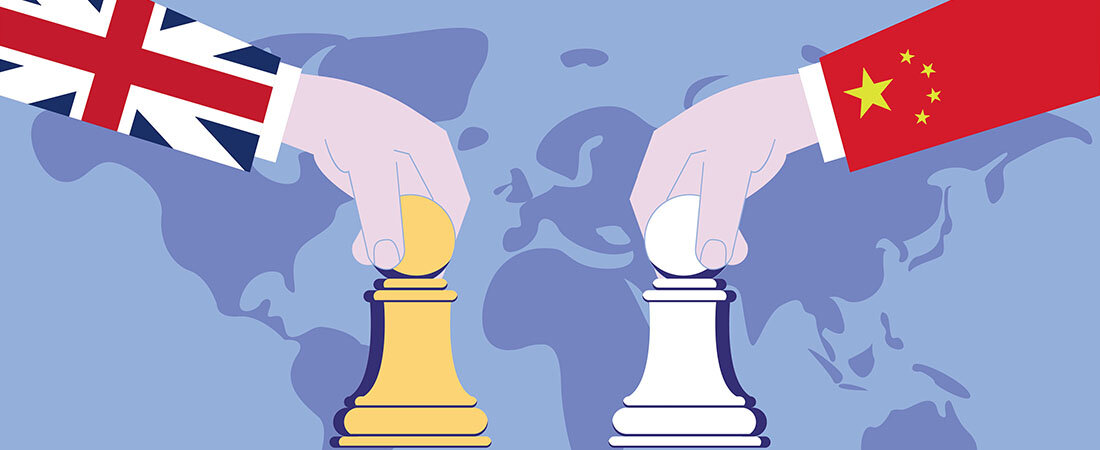Just a few months ago, Foreign Secretary James Cleverly argued that it’s “impossible, impractical and unwise” to define the UK’s policy on China through punchy catchphrases. His Labour counterpart, Shadow Foreign Secretary David Lammy, unsurprisingly responded by promising to audit the UK-China relationship based on three Cs: “challenge, compete and cooperate”.
In spite of all the heat around China in the Conservative Party, the Conservatives’ approach to China has rather maintained a similar direction since Cameron’s “golden era”. As our last article on China pointed out, despite the pressure from backbench hawks, the Government has maintained engagement with China on important issues. Although the Intelligence and Security Committee (ISC), chaired by the prominent China hawk Sir Julian Lewis, recently articulated the China threat, Prime Minister Rishi Sunak’s response favoured a slightly more moderate word choice of “epoch-defining challenge”.
Labour on the other hand, has been criticised for the absence of a “distinctive China strategy”. While Lammy’s three Cs are arguably sufficient for a party in opposition, it leaves blanks to be filled should they enter government. This is now more concerning than ever not only due to Labour’s continued strength in the polls, but also because of emerging opportunities.
Recently, the US bolstered its rapprochement with China: the US Secretary of State Blinken met President Xi, Secretary of the Treasury Yellen travelled to Beijing, Secretary of Commerce Raimondo conveyed American businesses’ concerns, the celebrated retired diplomate Kissinger spoke with a PLA general, climate talks were held, and the two superpowers even briefly discussed ending the war in Ukraine. Cleverly also eventually visited China, rebuking critical views against engaging with China for showing “a sign of weakness”. Although the Foreign Affairs Committee’s report broke China’s political taboo by referring to Taiwan as an “independent country”, China has made no notable reaction at all and downplayed the news, probably to safeguard Cleverly’s trip.
It is clear at this stage that the Labour administration sees China as a challenge. Echoing Lammy’s three Cs, Shadow Defence Secretary John Healey has called for a “strategy to challenge and compete with China”. Labour’s leadership and some of its hawkish MPs, including former Shadow Foreign Secretary Lisa Nandy, have been vocal about sanctions over human rights concerns. While these set the tone for a China policy, there is no clear and coherent agenda comparable to Labour’s blueprint for domestic affairs.
The issue stems from Labour’s domestic focus. Economic decoupling from China carries a cost and this does not align with Starmer’s “absolute foundational stone for everything” – growth. Within the Party, there is a prevalent group of self-labelled “pragmatists” who value the benefits in economics, supply chain and climate commitment from engaging with China which divides the Party’s backbench. The left-leaning, anti-war wing of the Party, though increasingly marginalised, would be keen to grab another chance like the 2003 campaign against the Iraq War to pressurise the leadership.
Outside Westminster, Labour is subject to a greater variety of inputs as well as constraints on its foreign policy, thanks to its internal democracy. Trade unions, already disillusioned over the rowbacks such as on employment rights, might devote less attention to threats on the other side of the globe. Similarly, the rank and file and fringe groups may voice their preferences through CLPs regardless of the grand-strategic plans in frontbenchers’ mind. After all, the Labour leadership’s autonomy in the policy process will largely depend on the size of the majority the Party secures.
An equally important, but rarely asked question, is what China would do with a Labour government. The long-termism in China’s foreign policy, if any, is often constrained by a lack of expertise on the UK and domestic pressures.
The insufficiency of expertise specifically on the UK prevents Chinese leaders from implementing long-term masterplans, despite their insulation from electoral accountability and thus greater discretion. The Chinese Academy of Social Sciences, a collective of China’s top-tier think tanks, has three country-specific institutes for the US, Japan and Russia, whereas the UK is covered by its Institute of European Studies, which primarily focuses on EU affairs. A recent publication contends that the US-UK Special Relationship remains the invariant defining feature of Sunak’s foreign policy.
China’s internal politics also compromises leaders’ flexibility when facing Western governments that are perceived unamiable. Robert Suettinger, Bill Clinton’s adviser on East Asian affairs, characterised Chinese leaders’ diplomatic priority by an obsession with “not being humiliated” when recalling NATO’s 1999 accidental bombing of Chinese embassy in Belgrade – any dovish response to seemingly uncordial Westerners would be interpreted as weakness, weaponised by opponents, and thus subvert the leader’s power base within the Communist Party.
As of now, facing alleged human rights controversies, Chinese leaders may harbour deep distrust towards the existing international order and its proponents. Exacerbated by the lack of a standalone UK policy and the British Empire’s notoriety in China’s anti-colonial historical narrative, they inevitably feel uneasy when engaging with the UK.
The opportunity for change in the case of a Labour government is double-pronged. Firstly, in Chinese leaders’ eyes, it was Conservative officials who were in charge when they faced pressures over Hong Kong and Xinjiang controversies, and Labour’s democratic socialist brand at least in name, despite its shift towards the centre, appears more familiar for Chinese officials.
While Labour’s stance on China is uncertain, electoral victory offers the chance to escape from the circle of mutual distrust. One possibility is a hawkish stance on China, probably due to a thin majority. In any case, if Labour wins a majority this presents an opportunity on both sides for a new relationship. The question remains about whether either will seize this chance.

